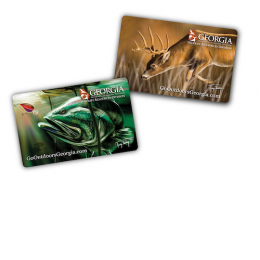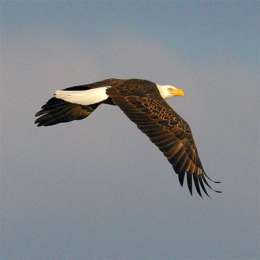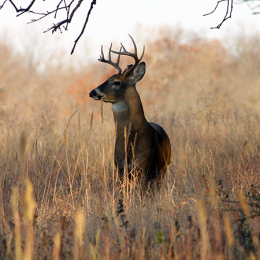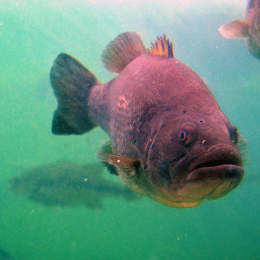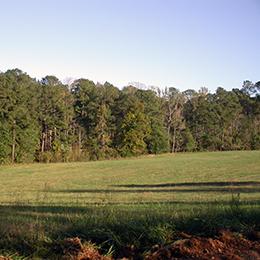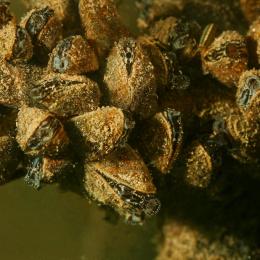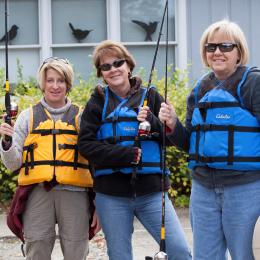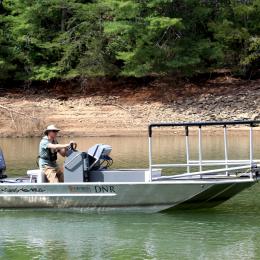Introduction
Regulating Agencies in Georgia
In Georgia, aquaculture and live fish sales (non-aquarium trade related) are regulated by the Wildlife Resources Division (WRD) of the Georgia Department of Natural Resources (DNR). Detailed Georgia Code sections and DNR Regulation sections pertaining to aquaculture and fish sales may be found at these sites: OCGA 27-4-74, 27-4-75, 27-4-76, 27-4-255, 27-4-256, 27-4-257 and Administrative Rule 391-4-14.
The Georgia Department of Agriculture also regulates certain aspects of processed food-fish sales and fish sold for the pet trade.
Basic Requirements to Raise and Sell Fish
The table below gives a basic overview of the types of licenses and permits that may be required for raising and selling various fish species or invertebrate organisms (i.e. freshwater prawns/shrimp and crawfish) in Georgia. Contact details and links to additional information are provided where necessary. Please be aware that definitions play an important role in determining what licenses or permits may be required. Links to appropriate definitions have been provided where necessary.
Activity
Licenses or Permits
Contact or More Information
Domestic Fish Culture and/or Sales
Does NOT include grass carp or tilapia (or exotic fish)
Aquaculture Registration (DNR)
Special Permits Unit
770-918-6408
Aquarium or Pet Trade Fish Sales
Pet Dealer's License
Georgia Department of Agriculture: Pet Dealer License
Grass Carp Culture or Sales
Wild Animal License (DNR)
Special Permits Unit
770-918-6408
Freshwater Shrimp/ Prawns or Crawfish Culture and/or Live Sales
No DNR permits required
Processed or Mobile Fish Sales For Human Consumption (Not Live Fish)
NOTE: this also includes FW prawns/ shrimp & crawfish
Any necessary DNR permits, licenses, or Aquaculture Registration PLUS one or more of the following (Dept. of Agriculture):
- Mobile Sales License
- Processing Facility License
- Wholesale Fish Dealers License
Georgia Department of Agriculture: Food Safety Division
Other Fish Culture and Sales Not Covered Above
(Examples: reselling commercially caught fish, selling or reselling non-domestic fish, selling fish under "tank and aquaria exclusion" of O.C.G.A. 27-5-5)
- Wholesale Fish Dealers License (DNR)
- Retail Fish Dealers License (DNR)
- Catch-out Pond License (DNR)
- Pond Draining Permit (DNR)
Wholesale, Retail and Catch-out Pond Licenses: DNR License Unit
(800-366-2661)
Pond Draining Permit: DNR Law Enforcement
The information below provides additional information and descriptions of the most commonly required permits and licenses referenced in the table above. It is not all inclusive. Potential fish dealers and aquaculturists should consult the more detailed Summary of Permits and Licenses Required for Georgia Aquaculture (PDF) for full license and permit information.
- For questions and additional information on obtaining an Aquaculture Registration or a license to sell grass carp (Wild Animal License) contact the WRD Special Permits Unit office at 770-918-6408. Aquaculture Registration Application Form.
-
For technical assistance with aquaculture production, fish culture, or ponds please contact the appropriate District or Regional Fisheries Management office that handles the county that your business operation or pond is located in.
-
Commercial Fish Dealers Licenses, as described in table and below, are issued by the DNR License Unit (706-557-3244). These may be obtained using the commercial license application.
Aquaculture Registration (obtained from DNR Special Permits Unit)
Aquaculturists producing and selling or re-selling domestic fish may register (free) with the Department of Natural Resources. "Domestic fish" are lawfully obtained farmed fish which are held in confinement in private ponds, but only if they are fish species which are either indigenous to Georgia or are fish species which have been recognized before 1992 as having an established population in Georgia's public waters. White perch (Morone americana) cannot be considered a domestic fish. A Commercial Fish Hatchery License, Wholesale Fish Dealers License (DNR), or Retail Fish Dealers License are not needed to sell domestic fish if the seller has registered as an aquaculturist. Persons in possession of domestic fish from registered aquaculturists must have a bill of sale or lading which provides the date of the sale, identifies the seller and which details two of the following three criteria for each species of fish: number, weight, or average length. Grocery stores do not have to register to sell domestic fish. Aquaculture Registration certificates expire on April 1 following two years of registration. Information provided by the aquaculturist for registration must be updated if there are changes during the registration period. Registration certificates should be displayed in a prominent location at the place of business, and a copy should be in possession of the owner or his agents when conducting business off the premises.
Examples of fish species that may NOT be raised or sold with an Aquaculture Registration and which require additional licenses include tilapia and grass carp, although these are not the only species. All grass carp dealers must be licensed through DNR (Wild Animal License).
Examples of species of fish that ARE included on the Aquaculture Registration application:
- Channel catfish
- Largemouth bass
- Rainbow, brown, and brook trout
- Crappie
- Bluegill
- Redear sunfish
- Hybrid sunfish
- Hybris bass
- Golden shiner
- Fathead minnow
- Goldfish
- Koi
- Common carp
- Freshwater drum
- Smallmouth buffalo
- Red drum
- Gizzard shad
- Threadfin shad
- Yellow perch
- Mosquitofish
Fish Dealers Licenses (obtained from the DNR License Unit)
A Wholesale or Retail Fish Dealers License is needed to sell live fish or fish eggs. Exceptions include persons with a Commercial Fish Hatchery License, persons selling fish for use in aquaria, and registered aquaculturists selling only domestic fish (see definition of domestic fish under Aquaculture Registration above). A Wholesale License is needed for persons selling fish to others for the purpose of resale, and for those persons importing live fish or eggs into the state. A Retail License is needed in other instances. Nonresident persons may sell and import live fish and eggs into the state without purchasing a license if they sell to a Department of Natural Resources licensed wholesale fish dealer. Fish sold from licensed dealers must be accompanied by a bill of sale or lading which provides the date of the transaction, identifies the seller and which details two of the following three criteria for each species of fish: number, weight, or average length.
Wild Animal License to sell regulated fish (obtained from DNR Special Permits Unit)
This license is required to possess, import, transport, transfer, sell or purchase any wild animal including exotic fish species. No license is needed for exotic fish (see exceptions below) if they are held in containers for holding fish from which no water is discharged, except during periodic cleaning, and which discharged water is passed through a filtering system capable of removing all fish and fish eggs and is disposed of only in a septic tank permitted by the county or in a waste water treatment system permitted by the Environmental Protection Division. Exotic fish are all fish species not native to Georgia. However, rainbow trout, brown trout, common carp, goldfish, and fathead minnow are examples of non-native fish that are not considered exotic fish for regulatory purposes. Exceptions: A wild animal license is always needed to possess:
- Banded tetra (Astyanax fasciatus)
- Piranhas (all species including the Genera Serrasalmus, Serrasalmo, Pygocentrus, Taddyella, Rooseveltiella, and Pygopristis)
- Grass carp (Ctenopharyngodon idella, see exception below)
- Silver carp (Hypophthal-michthys molitrix)
- Bighead carp (Aristichthys nobilis)
- Air-breathing catfishes (all species of the Family Clariidae)
- Parasitic catfish (Genera Vandellia and Urinophilus: all species)
Information for Grass Carp Dealers
The following information pertains to the sale of grass carp in Georgia. It applies to Georgia-based individuals and companies and out-of-state individuals and companies doing business in Georgia or with Georgia pond owners. Below are some facts and information about grass carp and the sale of grass carp in Georgia.
- Grass carp (Ctenopharyngodon idella) are an exotic fish species and are covered under Georgia Law in code sections O.C.G.A. 27-5-4 and 27-5-5.
- Only triploid grass carp may be sold or stocked in Georgia.
- Grass carp may only be purchased from properly licensed grass carp dealers. View a list of authorized suppliers.
- All grass carp dealers must be licensed through DNR (Wild Animal License).
- No permit is required for persons (pond owners) buying triploid grass carp from wild animal dealers licensed by Georgia DNR to sell grass carp if the buyer retains the bill of sale as proof, and the grass carp are stocked into a private pond.
All individuals, companies, or retailers selling grass carp need to be licensed by DNR and have a current Wild Animal License authorizing that activity. This applies to the sale of all grass carp, regardless of the quantity involved.
Just because someone is offering grass carp for sale (even a professional consultant as part of their services), they may not be properly licensed. A list of authorized grass carp dealers is available. This list is updated several times a year. You may also call your local Fisheries Management office to verify a dealer. When in doubt, ask about a dealer or supplier before you buy.
Grass carp cannot be sold with just an Aquaculture Registration. An Aquaculture Registration only covers the culture and sale of domestic fish species (such as channel catfish, largemouth bass, bluegill, rainbow trout, etc.) It does not allow you to raise or sell grass carp. Information on Aquaculture Registrations and general aquaculture permit requirements.
How do you know a dealer or supplier is properly licensed and selling triploid fish? You can check our website or contact our Fisheries offices to verify the status of a dealer or supplier. You can also ask to see a copy of their current license authorizing that activity. Fish coming from out-of-state suppliers will have a triploid certification for shipment into Georgia. All Georgia-based dealers and suppliers should also be selling triploid fish. Ask if the fish are certified triploid.
What about traveling or mobile fish trucks that come to farm and garden centers from time to time, do they need to be licensed? Yes. Those dealers must be licensed by DNR and possess a current license while doing business in Georgia.
Even if you are only a middleman and resell fish to pond owners you are considered a dealer and need a license. The only way that you would not need a license is if you are an employee of a licensed dealer or business and deliver fish as part of your job (you are not making a profit from the sale or delivery of the fish and are not acting as an independent agent, consultant, or contractor). You would, however, need to have a copy of the license in your possession.
- Grass Carp Dealer (Wild Animal License or WAL) applications are available from the DNR Special Permit Unit (770-918-6408).
- The Wild Animal License is good for one year and valid from April 1 through March 31 of the next year. If you are an active dealer you must renew your license each year by April 1.
Tilapia Information
Tilapia are becoming increasingly popular as a food fish species and they are often considered for use as part of aquaculture demonstration projects. Despite the growing popularity of tilapia, and the widespread availability of fish, there are some specific legal requirements related to keeping, raising, and selling tilapia that prospective culturists and educators should be aware of.
Under the Georgia Law (O.C.G.A. 27-5-5) pertaining to the Wild Animal Licenses requirements for fish, tilapia are considered an exotic fish species. Tilapia, and certain other exotic fish species*, may be raised and held in aquaria or tanks under certain conditions without needing to obtain any special licenses or permits. Selling tilapia will always require a license from DNR. The type of license required depends on how the fish are held (see below).
*Certain fish species always require a DNR-issued Wild Animal License, and may require liability insurance, regardless of how they are held. Tilapia are not one of those species. Included fish may be found on this Exotic Animals List.
Below is some information that will help you decide what licenses and permits may be required for culturing tilapia. Please consult this information before you begin a project or obtain fish. For technical assistance with aquaculture production, fish culture, or ponds please contact the appropriate District or Regional Fisheries Management office that handles the county that your business operation, school, or pond is located in.
Tilapia may not be stocked into ponds or lakes. This includes stocking for the purpose of raising them as a cultured species or for use as a forage species for other fish (i.e. supplemental feeding of trophy largemouth bass).
Under Georgia law (O.C.G.A. 27-5-5(b)(6)), all exotic fish which are not held in aquaria or tanks under certain conditions require a WAL. If tilapia are held or raised in a manner that does NOT meet all of the following conditions, a WAL would be required. Conditions that must minimally be met:
- Tilapia must be held in tanks or aquaria, which are defined as "containers for holding fish from which no water is discharged except during periodic cleaning", and;
- Water discharged during periodic cleaning must be handled and disposed of in a specific manner -" discharged water is passed through a filtering system capable of removing all fish and fish eggs and is disposed of ONLY in a septic tank permitted by the county or in a waste-water treatment system permitted by the Environmental Protection Division of the department [DNR]".
If your project or operation doesn't minimally meet the requirements listed above in numbers 1 and 2, then you need to contact DNR to find out about obtaining a Wild Animal License for tilapia.
The full wording of the "tank and aquaria exclusion" of the Wild Animal Act may also be found at O.C.G.A. 27-5-5(b)(6).
- Tilapia are held in tanks or aquaria in an enclosed building, classroom or greenhouse and ALL water generated during periodic tank cleaning is filtered to remove all fish and eggs and the water is discharged only into an approved septic tank or waste-water system (i.e. water is filtered and goes down the sink or into the sewer system)
- Tilapia are held and hauled in a hauling tank or truck from which no water is discharged (i.e. fish are netted out of tank or truck and placed in appropriate tanks or aquaria at their destination. At the conclusion of hauling activities, the hauling tank gets cleaned and the water eventually gets properly filtered and goes only into an approved septic tank or waste-water system).
Some examples of specific situations where all conditions of the "tank and aquaria exclusion" would NOT be met (and a WAL WOULD be required) follow. The following is not all-inclusive, but rather provides some examples of specific situations that may arise:
- Tilapia are to be held in cages in a pond or in raceways where water is discharged in the course of culture activities (or where the raceways are not contained or secure)
- Tilapia are held in tanks or aquaria where the water from periodic cleaning is to be discharged and disposed of somewhere other than in an approved septic tank or waste-water system (i.e. water will be used for hydroponics or applied to crops)
- Tilapia are held and/or hauled in tanks or on a hauling truck and the hauling water is not discharged into an approved septic tank or waste-water system (i.e. water is to be dumped onto the ground, in a field, or other area)
If a conditioned WAL is required for a tilapia project or operation, what types of conditions may be generally required? (Note: although all WALs are individually conditioned, the following examples show what may be required).
- The tanks and culture facility should be situated outside of the 100-year floodplain.
- The building or facility housing the tilapia should be secure and access should be able to be controlled (i.e. doors that can be locked, barriers or screens to prevent birds and predators from accessing fish/tanks).
- Tilapia should not be housed in the same tank or in the same culture system as other fish species that may be stocked into ponds or lakes, or offered for sale to be stocked into ponds or lakes. This prevents the unintentional spread or transfer of tilapia eggs or juvenile fish to the outside environment.
What DNR licenses are required to legally sell tilapia?
- If your operation or project requires you to obtain a conditioned Wild Animal License (WAL) from DNR, the WAL will also allow you to sell the species of fish covered by the license. These are annual licenses and must be renewed each year.
- If your operation or project can be done under the "tank and aquaria exclusion" of law (as described above) you will need either a Wholesale or Retail Fish Dealers license from DNR. These are annual licenses (good April 1 to the following March 31) that are obtained using the commercial license application.
Can tilapia be sold with an Aquaculture Registration?
No. An Aquaculture Registration only covers the culture and sale of domestic fish species (such as channel catfish, largemouth bass, bluegill, rainbow trout, etc.). Information on Aquaculture Registrations and general aquaculture permit requirements.
How do you apply for a Wild Animal License (WAL) from DNR and what fees are involved?
- WAL applications are available from the DNR Special Permits Unit 770-918-6408.
- WAL are valid from April 1 to the following March 31 and must be renewed annually.
Aquaculture Related Definitions
Familiarity with some basic legal definitions is crucial to a thorough understanding of aquaculture, fish sales, and wildlife laws. Here are some basic definitions:
- Wildlife: refers to those species of animals (mammals, birds, fish, amphibians, reptiles, crustaceans, and mollusks) indigenous to Georgia.
- Wild Animal: means any animal not indigenous to (exotics) Georgia and not normally a domesticated species. This group would include practically all exotic animals. Tilapia and grass carp are examples of fish that are included in this definition.
- Domesticated Species: are those animals that have traditionally lived in a state of dependence on and under the dominion and control of mankind and have been kept as tame pets or livestock. These may be possessed without permits.
- Domestic Fish Species: are lawfully obtained farmed fish which are held in confinement in private ponds, but only if they are fish species which are either indigenous to Georgia or are fish species which have been recognized before 1992 as having an established population in Georgia's public waters. White perch (Morone americana) cannot be considered a domestic fish.
- Game Fish: are the fish listed in OCGA 27-1-2(36) except for domestic fish as defined above and provide for in OCGA 27-1-2(23).
Full legal definitions for items covered under the Game and Fish Code are contained in OCGA 27-1-2.
Permit to Sell Game Fish From a Private Pond
Fish from ponds may also be sold under the circumstances described below using a special permit issued by DNR. This is generally done by a pond owner for the purpose of sport fish population management. It is not a means of producing and selling fish as an aquaculturist. This permit is also sometimes commonly called a "pond draining permit".
Game fish from a pond may be sold when the owner of the pond has obtained a valid permit from the Department of Natural Resources Law Enforcement Section and the permit is displayed in a prominent place at the pond. A permit will be issued only once annually and limits the time for taking fish from the pond to 15 days. Permit applications require two weeks to process. Find the appropriate Law Enforcement Division office for your county. To transport game fish taken from the pond, the fish must be packaged and labeled with the permit number and the number and pounds of each species contained in the package. Fish must remain so packaged until processed for consumption or released into another pond.
If you are a registered aquaculturist and the fish being sold are domestic fish, not game fish, then this permit is not required.
 An official website of the State of Georgia.
An official website of the State of Georgia.


